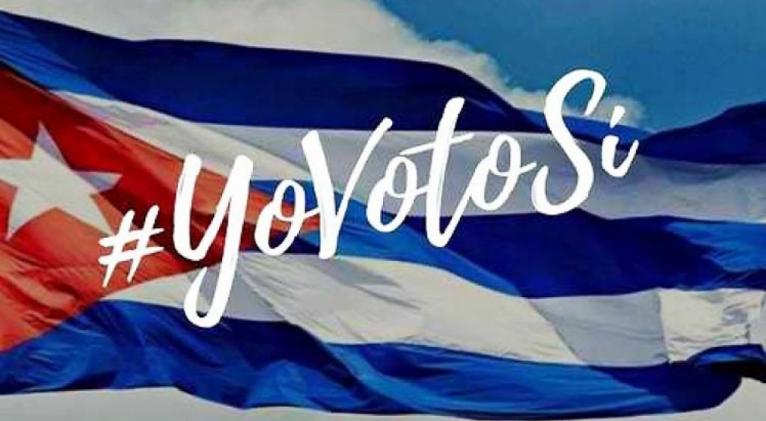Reasons for a YES for Cuba
especiales

Ana Sánchez Collazo, Elier Ramírez Cañedo and René González Barrio explain the reasons for voting YES for Cuba, in the coming elections on February 24th.
Cuban academics and intellectuals who line up with the principles of the Revolution, spoke to CubaSí about the essences and reasons that will take them to vote YES for Cuba in the coming elections on February 24th.
All patriots: The head of the Study Center of Martí, Ana Sánchez Collazo; the young historian Elier Ramírez Cañedo, and the president of the Institute of Cuban History, René González Barrio.
For my Present and my Future
“My vote will be Yes for my Homeland, my family, my present and my future”, affirmed Ana Sánchez Collazo, a woman who has found in Martí’s ideas a philosophy of life.
Very excited around these days, after participating in the 4th International Conference for World Balance, Ana Sánchez is convinced about the validity of Martí’s ideas and the need to study his work.
“As Cuban I am proud that this Constitution reflects the Cuba of today and that in addition guarantees the fundamental rights of human beings, for those the Revolution has fought for over 60 years.
“This new Constitution expresses something that our José Martí always said about the dignity of people, that it must be respected. It’s a text shaped to our times nowadays, to the needs we have today of defending what’s ours, but also open ourselves to the future and to the world.”
The professor added that this is a very advanced document that shows “our achievements” and, above all, it opens paths to keep the work of the Revolution. “For that reason I invite everybody who feels Cuban to vote for the Homeland!”, she emphasized.
A new Constitution, as Revolutionary as that of Guáimaro!
Academic, a PhD in Historical Sciences, member of the Drafting board of the Constitution, Elier Ramírez Cañedo considers that the process scheduled to finish on February 24th with a popular referendum has been historical and unparallel.
“We can’t deny that in the history of the Revolution other similar processes have occurred —for example, in 1976 another referendum took place—. However, that happened during these months is unparallel keeping in mind the level of participation and the role of new technologies as well as the social networks.
“That is, the fact that people have been able to participate two or three times in the consultation and give opinions in each space, even the opportunity to revise materials in the social networks, something that improved the presented project.”
The young historian qualified this Constitution as advanced, modern, adapted to the conditions of our country and, at the same time, thought for the future, in defense of our socialist system, the leadership of the Party, the unity, the praise to man’s dignity that “is present in the entire document.”
He added that the new Constitution increases dearly the number of Rights in comparison with that of 1976. These are some of the strong points.
“The process was a democratic exercise, plenty of debate that demonstrated us the popular knowledge and also that capacity attained by the Revolution, that’s why at present we have specialists of multiple subjects.
“It’s a Constitution that sets a landmark, not just in Latin America but also in the world, for the rights that incorporates and the guarantees of those rights.”
He pointed out that with this constitution begins a new stage with an extraordinary symbolism “because it takes place, in fact, on the 60th anniversary of the Revolution and with the presence of the Army General Raúl Castro Ruz, the number follower of Fidel of all Cubans, directing the Drafting Board of the constitution.
“Besides that is proclaimed in the 150th anniversary of our first Constitution of Guáimaro to be commemorated next April 10th. Nevertheless, I consider that the new text is still as revolutionary as the one approved by our freedom fighters in 1869 and that pays homage to our history, where the ideas of Martí and Fidel are also present.”
Consequent with the Homeland History
For René González Barrio, to vote YES next February 24th implies to be consequent with the history of our nation, with the project began by Carlos Manuel de Cespedes and that Fidel was able to make real with the victory of the Revolution.
“It means to be consequent with all the fallen revolutionaries all those years of making the Revolution before and after 1959 in the fight against bandits, in the Literacy Campaign, in the internationalist missions. The entire effort, the sweat and blood of our people rests in that Constitution which is the result of popular knowledge.
“Because it’s been a democratic process it has allowed us to enrich the initial project feeding on the comments, additions, and teachings of the people. To vote YES for this new Constitution is to say YES for the project of Homeland that we Cubans have chosen.”













Add new comment